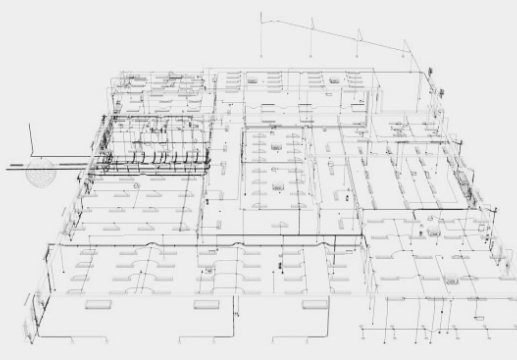House HVAC Design Services: How to Choose the Right Residential HVAC Designer in the USA
The heating, cooling, ventilation and air conditioning system of a residential space is planned and laid out through HVAC design services.
Read ArticleThe Residential energy calculations for a household depend on the usage of energy. The energy requirement for every home depends on the level of insulation, location of the house, basis of the climate zone, usage of appliances, size of the house and availability of heating and cooling systems. Have a look to understand the nitty gritty of the calculations needed for energy modelling in households.
Concept of Residential Energy
Going by the nomenclature, residential energy is the total energy consumed by a household. In a residential space, energy is mostly consumed by lighting, heating, cooling, cooking and functioning of appliances. Popular as home energy, residential energy is crucial for the seamless functioning of the house.
Residential Energy Calculations
The detailed calculation refers to the total amount of energy consumed in a residential space, which is what we refer to as residential energy calculations. This is determined on the basis of the insulation level of the house, the size and nature of appliances used, heating and cooling requirements, and the geographical location of the house.
There are quite a few factors that determine home energy efficiency calculations. They are climate conditions, building features, heating and cooling systems and household appliances.
Need for Residential Energy Calculations
This type of calculation is primarily done to understand the energy efficiency of a residential space. Residential energy efficiency is a crucial strategy for decreasing greenhouse gas emissions. Many technologies help boost residential energy efficiency, and in fact, geared-up energy efficiency has already facilitated the reduction of global greenhouse gas emissions in the past. This calculation helps us to learn the quantity of energy a home consumes and spotlight the areas for improvement in optimizing usage. This also helps in making wise decisions about estimating potential cost savings and use of energy-efficient appliances. This is also a crucial step in decreasing carbon emissions and incorporating efficient building designs.
Residential Energy Calculations for Efficient Home Design
The calculations, based on residential energy use, are critical factors to build energy-efficient home designs. If anyone is planning a new home or planning for a detailed remodel of an existing house, it is always a wise choice to build an energy-efficient home. To optimize the efficiency level of the whole house, the team of engineers and designers must consider an array of variables before finalizing the design draft.
Lighting System
When someone switches to energy-efficient lighting, it can save up to a lot of electricity costs. By using LED lights, one can enjoy the same amount of illumination with reduced bills. Ideally, lighting accounts for around 15% of an average home’s electricity use. Energy-efficient LED lights, in place of incandescent light bulbs, change residential energy calculation and are one of the best ways to make the home energy efficient.
Appliances
Switching to energy-saving home appliances makes a lot of difference. One can also reduce the bill by decreasing the usage hours.
Ways to Build Efficient Homes
Energy-efficient homes merge state-of-the-art energy-efficient construction practices, equipment and lighting with commercially available renewable energy systems. This includes solar water heating and solar electricity systems. Designers often use their expertise to install passive solar heating and cooling systems to make an efficient home design. Energy-efficient landscaping strategies also help reduce cost-effective home energy use. It also helps to meet the dropped load with on-site renewable energy systems.
Features of an Efficient Home
Coral Roofs
Installing coral roofs is one of the prime factors of residential energy use optimization techniques. When a cool roof is installed on a home, it reflects sunlight and decreases the temperature of the roof. Reflective components in the roofing material, like tiles, paint and shingles, are used to form a cool roof. This energy-saving technique is highly beneficial for building a home in hot and dry areas where the cost of air-conditioning is extremely high.
Solar Lighting
Including the installation of solar panels on the roofs effectively reduces energy consumption in every home. Not only does it reduce electricity bills, but it also saves money on roofing materials. One can plan for a solar water heater and install it straight on your roof in addition to solar panels to impact and reduce your monthly expenditures.
House Framing
As a part of the process to boost home energy efficiency,advanced house framing is another best practice. Also known as optimum value engineering, you can build or renovate a wood-framed house and reduce lumber use to decrease energy wastage.
Advantages of Energy-Efficient Homes
It is needless to state that efficient energy modelling comes with a lot of benefits.
Wrap-Up
The concept of residential energy calculations is made to understand the total amount of energy consumption in a household. In every home, the use of various appliances and heating and cooling systems determine energy usage. The calculation is also based on the geographical location of the house and the available space for living. People nowadays focus on energy-efficient homes to reduce consumption and bills. Many companies specialize in calculating residential energy and suggesting measures that can reduce and optimize consumption. Rual LLC is an American company that specializes in civil design and engineering services. Located in Cheyenne, USA, Rual has a pool of talented engineers and designers who have immense knowledge and experience in making homes energy-efficient. If you are struggling with robust energy consumption and want to optimize the calculation, connect with Rual LLC for the best experience.

The heating, cooling, ventilation and air conditioning system of a residential space is planned and laid out through HVAC design services.
Read Article
The entire gamut of planning, designing, and engineering of the ventilation and air conditioning system comes under the realm of HVAC design USA company offers.
Read Article